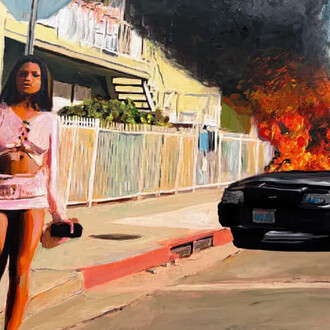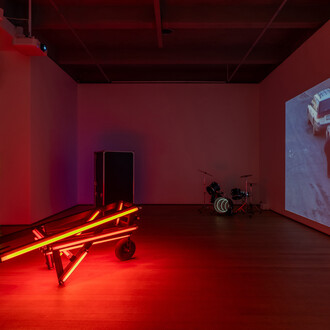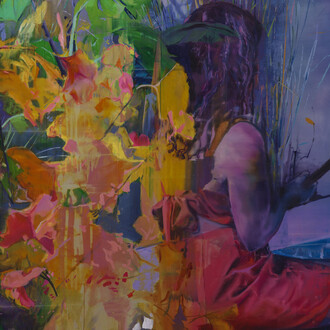From October 25, 2013, through January 22, 2014, the Solomon R. Guggenheim Museum presents a retrospective of American artist Christopher Wool, assembling the most comprehensive examination to date of his rigorous oeuvre. Featuring approximately 90 paintings, photographs, and works on paper, Christopher Wool explores developments across the artist’s influential career, from his early uses of appropriated patterns and text to recent abstract works created through collage, erasure, and digital manipulation.
The exhibition is organized by Katherine Brinson, Associate Curator, Solomon R. Guggenheim Museum. Following its presentation in New York, Christopher Wool will travel to the Art Institute of Chicago from February 23 through May 11, 2014.
Christopher Wool is generously supported by Guggenheim Partners, LLC.
Major support is provided by the Leadership Committee for the exhibition: Luhring Augustine, New York; The Brant Foundation, Inc.; Thompson Dean Family Foundation; Stefan Edlis and Gael Neeson; Gagosian Gallery; Danielle and David Ganek; Brett and Dan Sundheim; and Zadig & Voltaire. Additional Leadership Committee gifts are provided by The Broad Art Foundation, Santa Monica; Marguerite Steed Hoffman; Bridgitt and Bruce Evans; Galerie Max Hetzler, Berlin; Mr. and Mrs. J. Tomilson Hill; Agnes and Edward Lee; Nina and Frank Moore; Nancy and Woody Ostrow; Elham and Tony Salame; Cynthia and Abe Steinberger; Jennifer and David Stockman; Christen Sveaas; and David Teiger.
This exhibition is also supported by The Andy Warhol Foundation for the Visual Arts, with additional funding provided by the Juliet Lea Hillman Simonds Foundation.
Since his emergence in the 1980s, Christopher Wool has forged an agile, highly focused practice that ranges across processes and mediums, paying special attention to the complexities of painting. Each new work is a site of restless experimentation in which Wool continually disrupts and renews the terms of his artistic production. This survey will fill the Frank Lloyd Wright-designed rotunda and an adjacent gallery with a rich selection of largely monochrome paintings, works on paper, and photographs. With the exception of two galleries at the starting and ending points of the installation that will intersperse works from different periods, the exhibition will unfold along loosely chronological lines, presenting an overview of pivotal developments in the artist’s career. A large-scale bronze sculpture by Wool, Untitled (2013), will be installed outside the museum on the occasion of the exhibition. The work represents Wool’s first representation of the medium since the mid-1980s.
Wool was born in 1955 and grew up in Chicago. By the early 1970s he had settled in New York City, where the anarchic, interdisciplinary energy of the punk and No Wave scenes were a defining influence on his creative development. In the subsequent decade, he set out to explore the possibilities of painting at a time when many considered the medium outmoded and irrelevant to avant-garde practice. The exhibition begins with a group of 1987 pattern paintings that represent a key breakthrough for Wool. These works use paint rollers incised with floral and geometric designs to transfer all-over patterns in severe black enamel to a white ground. Collapsing any distinction between the physical process of making the painting and its visual content, these everyday tools provided the artist with a repertoire of readymade imagery that avoided both spontaneous gesture and self-conscious compositional decisions. Instead, the works focus attention on the small failures that occur within this mechanized framework, allowing breakdowns and slippages in the patterns to accrue a delicate emotional resonance.
During the same period, Wool initiated a body of work that similarly subverted a set of existing forms, this time taking language as his appropriated subject matter. Rendering a word or phrase in bold, blocky stencils arrayed across a geometric grid, he preserved the specific form and order of the language but freely stripped out punctuation, disrupted conventional spacing, and removed letters. The resulting works oscillate between verbal communication and pure formalism, their structural dissonance reflecting the state of anxiety and agitation conjured by the texts themselves.
From the early 1990s through the present, the silkscreen has been a primary tool in Wool’s practice. In the earliest examples of his screenprinted paintings, Wool expanded on the vocabulary of his pattern works, isolating their stylized floral motifs to use as near-abstract units of composition. Frequently in this period, the artist sabotaged his existing forms as a way to covertly generate new ones, layering the flower icons in dense, overlapping configurations that congeal into a single black mass or are obscured with passages of brusque overpainting. A number of works created in 1995 evidence Wool’s introduction of a new, wholly freehand gesture in the form of a looping line applied with a spray gun—an irreverent interruption of the imagery below that evokes an act of vandalism on a city street.
Wool’s attraction to the bleak poetics of the urban margins was amplified in his first major photography series, Absent Without Leave (1993), which will be exhibited in depth for the first time in this presentation. The work comprises images taken during a period of largely solitary foreign travels, in Europe and elsewhere. Saturated with alienation and shot without any concern for technical refinement, the raw contingency of these vignettes was intensified when Wool transformed them into black-andwhite photocopies. The same mood of disaffection pervades a parallel body of photographic work titled East Broadway Breakdown (1994–95/2002), but in this series Wool focused on a more familiar journey— his nightly walk home from his East Village studio. Highlighting the city’s unadorned, off-hours existence, the images depict a nocturnal landscape emptied of citizens and stripped down to a skeleton of streetlamps, chain-link fences, blemished sidewalks, and parked cars.
The exhibition will examine the critical conceptual shift that occurred in Wool’s practice in the late 1990s when he began to purloin his previous creative output as material for new, autonomous works. He would take an image of a finished picture, transpose it to a silkscreen, and then reassign it wholesale to a fresh canvas. In works such as He Said She Said (2001), the original image is left untouched after these acts of self-appropriation, although uncannily transformed by the process of mechanical reproduction. At other times, Wool manually reworks his silkscreened doubles, adding new rollered paint (Untitled, 2001) or sprayed enamel (Last Year Halloween Fell on a Weekend, 2004) to create disorienting hybrids that entwine recycled and original gestures.
Over the past decade, Wool’s simultaneous embrace and repression of painting’s expressive potential have culminated in an open-ended body of work he calls his “gray paintings.” In these large-scale abstractions, Wool alternates the act of erasing with the act of drawing, repeatedly wiping away sprayed black enamel paint with a rag to create layers of tangled lines and hazy washes. The artist describes the cycle of composition and loss inherent to this process as an attempt to harness the condition of doubt as a generative creative force. The same challenge to the authority of the unique, original gesture is extended in a group of 2011–12 canvases in which Wool uses digital processing to distort the scale, color, and resolution of his painted marks, often merging them with details from other paintings. A single work might synthesize the traces of multiple past moments of creation, with images returning in new guises to be considered afresh within Wool’s evolving pictorial investigations.
A richly illustrated catalogue with a cover specially designed by the artist will accompany the exhibition. It will feature a critical overview of the artist’s career by exhibition curator Katherine Brinson and the most authoritative exhibition history and bibliography of Wool’s career yet compiled. In addition, the catalogue will include scholarly essays by Suzanne Hudson, Assistant Professor of Modern and Contemporary Art at the University of Southern California, and James Rondeau, Frances and Thomas Dittmer Chair and Curator of Contemporary Art, Art Institute of Chicago, as well as a text by the artist Richard Prince. A hardcover edition priced at $55 will be available at the museum store, online at Guggenheimstore.org, and distributed in the United States through D.A.P.
All images: Christopher Wool, Installation Views, photo by David Heald.



















